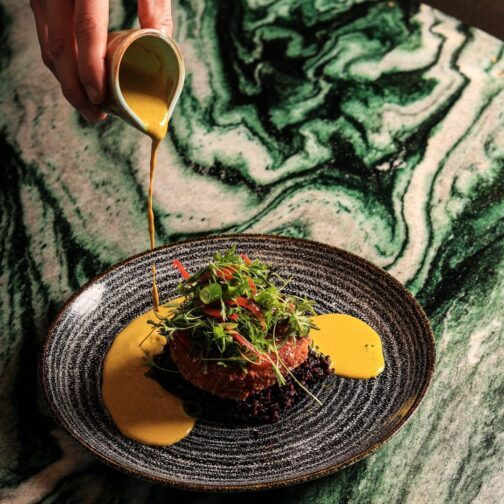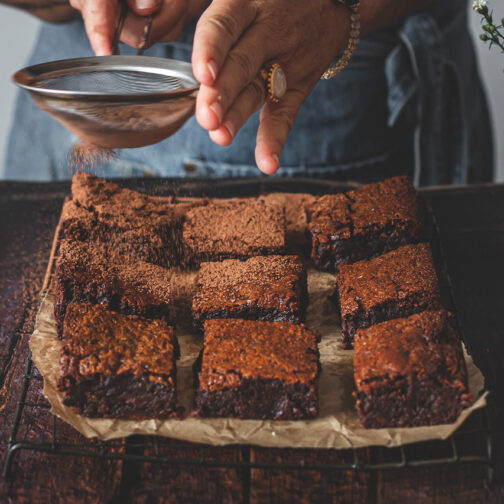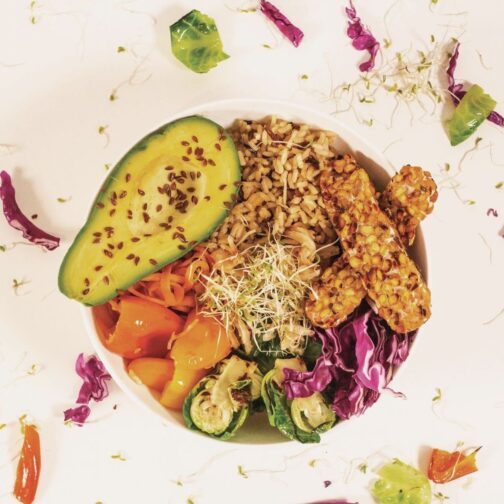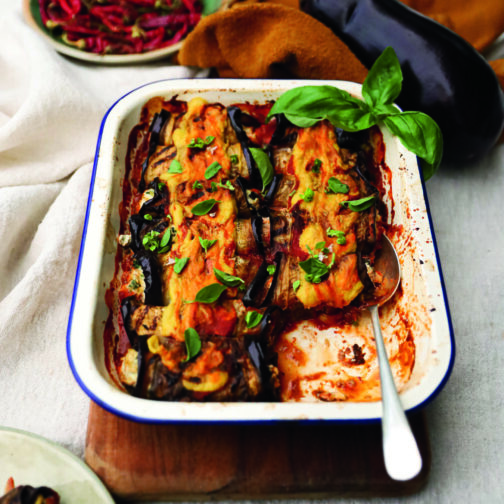
Going vegan can be a life-changing experience, and it’s not without its challenges. The good news is you’re not alone. There are identifiable stages and ways to make them easier.
I’m a podcast host who has interviewed numerous people in the vegan community. Despite speaking with a diverse range of guests, I get almost-identical answers to the standard questions: Why did you go vegan? How did your family and friends react? What was the most challenging aspect? I never expected to uncover so many similarities in our experiences of going vegan! Yet there seems to be seven stages we all move through when making the transition, these include:
Here’s how to move through each one, with your patience, nutrition, and mental health intact.
1. REALISATION
The first stage is making the connection between food and the impact it has on animals, the environment, and your health. Often this is not a single lightbulb moment but the culmination of many internalised feelings and experiences. This can be an overwhelming time as we overcome our cognitive dissonance – the uncomfortable psychological conflict of holding contradictory beliefs. In this case, realising that consuming animal products doesn’t align with our core values. It’s completely normal to experience emotions such as sadness, anger, shock, or feeling like you’ve been lied to. Sometimes we may even look for justifications or potential counter-arguments to making the transition. Katrina Fox says, “I’d been taken in, like everyone is, by the happy-cow-type ads … and suddenly I woke up and realised how utterly illogical they were. I felt guilty for a while, and I was quite annoyed at myself.” Take your time to process your realisations and recognise that they are a fundamentally different view to what you previously held, which will become more normal with time. Allow yourself to feel your emotions, and consider seeking professional support if you need help working through conflicting beliefs.
2. EDUCATION
What follows after realisation is an intense phase of learning – often marked by watching truth-telling documentaries and reading information that helps us to understand the issues. Typically, this research solidifies your decision. Depending on your personality type, your research phase could be quite brief or, if you need to know all the details, it could take a while longer. The objective is generally to prove to yourself that your realisation was right, and that changing your lifestyle is warranted. You’ll need to keep in mind that documentaries can be very graphic, showing unimaginable cruelties that exist in primary industries. Faced with horrific evidence, it is normal to feel denial (surely that doesn’t happen here!), horror, guilt, grief, and anger. Sarah Brown shares how she felt when researching the egg industry. “I was like woah, that is messed up. That does not align with my morals one bit … after two months of being vegetarian, I went vegan.” Take care during this stage – bearing witness to animal suffering can take an immense toll on your mental wellbeing. Consider reading or listening to a podcast if the images in documentaries are too much. Try to avoid overwhelming yourself too. If you have reached your decision to go vegan, take a break from the research. Know that you can continue to learn as you go.
3. ACTION
Once equipped with sufficient information, there is a quick shift from rumination to action. Strong emotions compel us to not only make a change in our own lives but to share our new views with those around us. Cue the passionate (or angry) new vegan phase. This is probably one of the most identifiable phases of veganism. Ask most vegans and they can point back to this period in their lives, often comprising a mix of proud and not-so-proud moments. Amanda Ducks reflects, “When I first went vegan, I was pushy and awful to a lot of my loved ones. Why would anybody listen to me when I was coming at them, being so negative and attacking them? Now I just want to encourage people to eat more plants in general.” Everybody is on their own journey – family and friends may not want to hear the details of your research. Try not to be disheartened. Sometimes, to preserve your relationships, it’s best to lead by example rather than starting an argument at the family barbecue. Be prepared to accept that you will be challenged or perhaps teased for your decision to go vegan, and those closest to you may even have genuine concerns for your health. Have some simple, unprovoking, fact-based answers ready to alleviate their worries. Don’t isolate yourself. Even if loved ones don’t understand, it doesn’t mean you have to drive them away. If anything, you need them now more than ever as you go through this internal transformation.
4. EXPLORATION
Thankfully, despite a few early challenges to going vegan, there is also a lot of excitement and joy in stepping into this new, compassionate way of living. Contrary to popular belief, rather than feeling restrictive, going vegan can be quite an expansive and exciting time of experimentation and discovery that includes different foods, events, and restaurants. This period also marks a second wave of more uplifting research – where you seek out practical steps to take, try new foods, and better understand plant-based nutrition. Going vegan is a more gradual process in practice than you may realise. Food is often the first change, but it can take months and sometimes even years to fully eliminate animal products, with cleaning products, beauty, fashion, and household items next in line. As you progress through this transition, there is a phase of discovery for each category. Share the love at this time! Food can be a positive way to introduce family and friends to your new lifestyle. Invite them over to try your new favourite recipes or go out to discover plant-based restaurants. Getting out and about – to World Vegan Day events or a vegan market – can open up worlds of possibility and be a source of inspiration.
5. PEACE
Once you have settled into your new lifestyle, there can be an unexpected and surprising inner calm, confidence, and contentment from living in alignment with your beliefs and values. This is probably one of the least discussed aspects of going vegan, and potentially the most intangible, only known to those who have experienced it. Listening to your inner voice and making the decision to do what you believe is right, even though difficult, is not only empowering, but it also relieves you from the discomfort of cognitive dissonance. Katie White says, “It feels like you are peeling back these veils of illusion, and you become the most authentic, enlightened, and liberated version of yourself. You’re no longer living by your conditioning or what you were told as a child. You’re living by truth. It’s a fantastic feeling.” Be proud of yourself – you have gone against the grain to honour your highest self. Bask in the feeling of confidence and empowerment. As you reflect, this is a great time to consider how you might further engage in veganism in the future. Would you like to share your experience with others? Will you volunteer with or donate to charities or political organisations? For many, simply being vegan is enough. That is entirely up to you.
5. CONNECTION
While going vegan can initially feel like an isolating experience, it quickly becomes one of connection. The vegan community is an incredible centre of friendship, knowledge sharing, resourcefulness, creativity, and inspiration. People from all walks of life have gone vegan for many different reasons, and it can be a great way to find like-minded friends, mentors, and even business opportunities. Community is an essential ingredient to staying vegan long term. Not only will these connections keep you buoyant and inspired, but they will also offer respite from the frictions of being vegan in a non-vegan world. Make an effort to find your tribe. There are so many ways to meet people, both online and offline. Social media is a great starting point and can also help you find out about in-person meet-ups, events, as well as activism and volunteering opportunities.
7. THE NEW NORMAL
After a while, being vegan simply becomes a way of life, with little effort required to maintain it. Just like before you went vegan (but better for you, animals, and the environment!). Trips to the supermarket are no longer painfully slow label-reading expeditions because you now know what to buy and where to find it. You’ve discovered your favourite products, cafes, restaurants, beauty products, and more. Temptation to eat animal products fades and often it becomes unimaginable to eat non-vegan food or to behave in any other way. Kitch Catterall explains, “I don’t see it as food, it just doesn’t look good anymore.” Family and friends will eventually come to accept your lifestyle, and it will no longer be a point of conversation every time you visit. You’ll meet vegan friends or find ways to get involved in the community. Your ‘why’ is front of mind and keeps you motivated if you encounter any challenges. It’s time to enjoy the ease of being vegan!





















